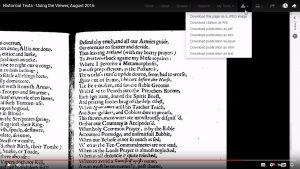Here at the Historical Texts and Journal Archives team (http://historicaltexts.jisc.ac.uk and https://journalarchives.jisc.ac.uk) we strive to provide our users with the kind of support that is properly relevant to their needs. As such, we explore quite a large range of support activities to try and cater for as many differing requirements as possible.
We look to surface our content and expose it where possible to try and drive our usage and increase better understanding of the sorts of material our services hold for our users – which can sometimes be surprisingly varied and diverse.
Our YouTube Channels (https://www.youtube.com/user/jischistoricaltexts and https://www.youtube.com/user/jiscjournalarchives) hold several screencast videos. Our primary driver for these is that it’s often easier to understand when you see somebody doing something, rather than reading about it – especially for new users to the service. They also allow for any potential users who aren’t subscribers yet to see what the service looks like.
Topics covered include basic introductions to the services, promotional videos for conferences, and more in-depth usage tutorials.
A new video on “How the Collections in Historical Texts Differ” has just been released – this includes differences between the metadata and how the images were originally captured, which can have a bearing on what results are returned in searches, or what features are available in the Viewer.
Another new video on using advanced search features is completed, pending release shortly.
We make these screencast videos in-house, and update them regularly in order to keep them in line with any developments and changes to the services.
The Historical Texts homepage has a display of 21 images (7 from each collection) that are selected by us and link directly to interesting publications, related to topical themes for the month.
These are changed monthly – we do this as a “teaser” to encourage browsing users to click through and explore the collections, but also to make the page isn’t always the same for regular or repeated users. We also occasionally make one-off themed sets, like the ones we made for #shakespeare400 throughout April this year.
Both the services have dedicated FAQ pages (http://historicaltexts.jisc.ac.uk/faq and https://journalarchives.jisc.ac.uk/faq), and Librarian pages (http://historicaltexts.jisc.ac.uk/librarians and https://journalarchives.jisc.ac.uk/librarians) to assist regarding common queries for both students and staff.
We also provide Quick Reference Guides (for new users to the services) as web page and PDF download.
One of the unique selling points of Historical Texts is that it includes both the Early English Books Online (EEBO) and Eighteenth Century Collection Online (ECCO) collections in a single platform.
As institutions look to switch to Historical Texts from the separate platforms provided elsewhere, we’ve made dedicated (and downloadable) Transition Guides to help users make the switch to using our interface more easily.
We also have several Features pages for Historical Texts which are themed around topics including “Maps”, “Music”, “Witchcraft”, “Local History of London” and more, which hold more selected images as well as hints and tips on how to search the service most effectively.
You can find the Features main page here. More Features are currently under development.
All of the support materials described here can be linked to or found from the service Support pages, found at http://historicaltexts.jisc.ac.uk/support and https://journalarchives.jisc.ac.uk/support.
We maintain Twitter accounts for both services (@historicaltexts and @journalarchives), and schedule in advance a minimum of a tweet per day for each service, linking to topical content, as another means to bring users in and surface content that users might miss in their searching.
We also use this to promote new features, new support materials, and new content– for example, the open-access “Spare Rib” journal archive that was added to Journal Archives last year, or the upcoming UK Medical Heritage Library (UKMHL) collection scheduled to join Historical Texts.
We find it invaluable for building links with our user base.
We’re always open to feedback and new suggestions – if you’ve got some good ideas about support activities we haven’t undertaken that you’d like to see, why not let us know at historicaltexts@jisc.ac.uk or journalarchives@jisc.ac.uk?

